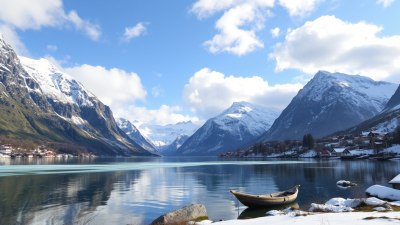How to Let Wanderlust Lead to Wellbeing
Explore how embracing wanderlust can enhance your wellbeing and mental health through travel and new experiences.

Image created with Flux Schnell
Wanderlust, the strong desire to explore the world, has fascinated many since the beginning of civilization. It ignites a thirst for adventure and an urge to experience diverse cultures, breathtaking landscapes, and profound stories. While wanderlust often is associated with travel, its broader implications for wellbeing are profound and multifaceted. This article delves into how letting your wanderlust guide you can significantly enhance your mental and emotional health, stimulate personal growth, and foster connections with others, ultimately leading to a richer, more fulfilling life.
The Psychological Benefits of Travel
Traveling can serve as a powerful antidote to stress, anxiety, and depression. When you step out of your routine and into the unknown, the brain's reward centers activate. Novelty and new experiences release dopamine, the brain's feel-good neurotransmitter, which can alleviate symptoms of mental distress. Furthermore, immersing yourself in different cultures and environments can shift your perspective, helping you to find solutions to your problems that may have felt insurmountable before. A change of scenery often helps shift your mindset and fosters creativity.
Enhancing Connectivity with Nature
Wanderlust often drives individuals to reconnect with nature, whether through hiking, camping, or exploring national parks. Nature has an innate capacity to rejuvenate the mind and spirit. Studies show that spending time outdoors can decrease levels of cortisol, the stress hormone, and increase overall happiness. The tranquillity of a serene landscape, the sound of a river flowing, or the sight of a majestic mountain can lead to profound moments of reflection and peace. Furthermore, adventures in nature provide opportunities for mindfulness, allowing you to immerse yourself in the present moment.
Cultivating Relationships Through Travel
Travel has the remarkable ability to create bonds between people. Whether you're traveling with family, friends, or even meeting new people on the road, shared experiences lead to deeper connections. These experiences can include challenges faced during travels, laughter shared over meals, or awe-inspiring sights witnessed together. Travel fosters adaptability and collaboration, traits that strengthen relationships. Furthermore, understanding different cultures can inject empathy into your relationships, making you more attuned to the feelings of others.
Personal Growth Through New Experiences
Wanderlust encourages you to step outside your comfort zone and embrace the unfamiliar. This can be as simple as trying new foods, learning a new language, or navigating through a bustling foreign city. Challenging yourself to partake in unfamiliar experiences cultivates resilience and adaptability, two key components of personal growth. Overcoming challenges during travel enhances self-confidence, making you feel capable of tackling challenges back home. These experiences translate into a broader worldview, enriching your understanding and appreciation of life.
Mindfulness in Travel
In a world filled with distractions, the act of traveling can inspire mindfulness. Wandering through foreign streets or soaking in the sights of a distant land fosters a sense of presence that often is lost in daily life. By focusing on the here and now, you can cultivate a sense of gratitude and appreciation for experiences that contributes to overall wellbeing. Mindful travel means savoring each moment, from experiencing the aroma of local cuisine to engaging with the community. Incorporating mindfulness practices into your travels can amplify their positive effects on mental health.
The Art of Spontaneity
Wanderlust often thrives on spontaneity. While planning is essential, leaving room for unplanned adventures can lead to some of the most memorable experiences. Embracing the unexpected can bring joy and excitement, breaking the monotony of routine life. This spontaneity allows for serendipitous discoveries and interactions that planned itineraries might overlook. The thrill of uncertainty can foster a sense of flexibility and acceptance, key elements of wellbeing and mental health.
Traveling for a Cause
Travel doesn't need to be purely recreational. Many individuals find purpose and fulfillment in traveling for a cause, including volunteer work or participating in community-building initiatives abroad. These experiences can profoundly impact your perspective and contribute to a sense of fulfillment. Engaging productively within diverse communities often leads to psychological rewards, such as a sense of belonging and accomplishment. Traveling for a cause can deepen your understanding of global issues and inspire individuals to act for positive change.
Finding Balance: The Return Home
After embarking on your adventures, returning home can bring mixed emotions. While the return to familiarity may feel comforting, the transition can also be difficult, as one might miss the adventure and excitement experienced during travels. It’s essential to find ways to integrate the lessons learned from travel into your daily life. This could involve maintaining new relationships, pursuing new hobbies inspired by your adventures, or simply taking time to reflect on your experiences. Practicing gratitude for the journey can help mitigate feelings of post-adventure sadness.
Setting Intentions for Travel
When planning your journeys, set intentions that align with your personal wellbeing goals. Whether it's seeking relaxation, adventure, learning, or cultural immersion, clear aspirations can guide your travels in ways that enhance your wellbeing. Establishing a balance between exploration and personal reflection can lead to a more rewarding experience. Overall, setting these intentions serves to remind you of the inherent transformative power of travel.
Integrating Wanderlust into Daily Life
Wanderlust doesn't need to be an abstract concept relegated to vacations or trips. It can permeate daily life through experiential activities. Explore local neighborhoods, museums, and cultural events to introduce small doses of adventure. Attend workshops or classes that expose you to different cultures or skills. Incorporating elements of wanderlust into your routine can enhance creativity, broadening your perspective and creating a sense of novelty even within the familiarity of home.
The Journey Towards Wellbeing
Wanderlust is more than just a desire for travel; it’s a potent pathway to enhancing your overall wellbeing. By embracing the urge to explore the world, connect with nature, cultivate relationships, and challenge yourself, you embark on a journey filled with personal growth and emotional enrichment. While the world awaits your footprints, it's essential to recognize the invaluable lessons learned along the way. From the thrill of spontaneous adventures to mindful moments of reflection, wanderlust transforms the journey of life into a vibrant tapestry of experiences rich in meaning and connection.











